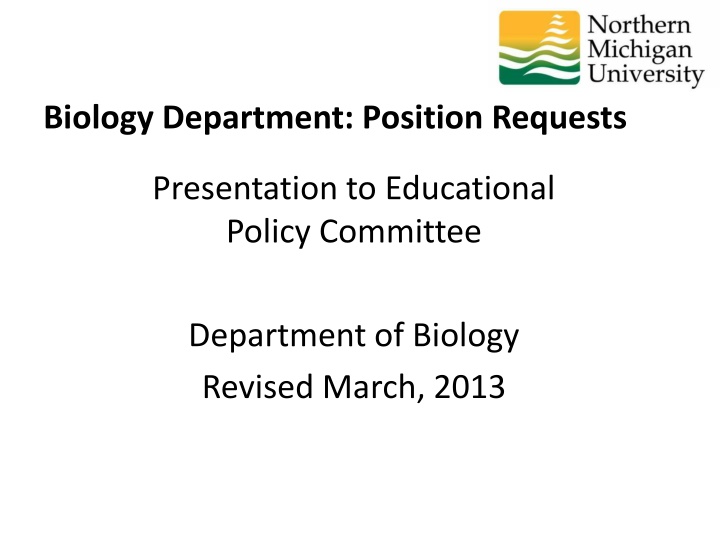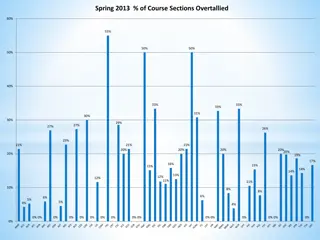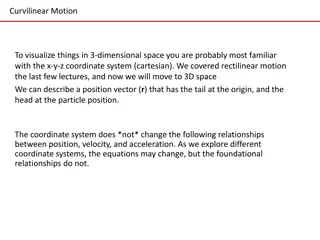
Biology Department Faculty Requests and Challenges for Growth
Discover the Biology Department’s priorities for faculty positions, including the need for a human physiologist and growth in bioinformatics. Learn about the challenges faced, such as faculty reassignments impacting course delivery and the increasing demand for mentoring students engaged in research.
Download Presentation

Please find below an Image/Link to download the presentation.
The content on the website is provided AS IS for your information and personal use only. It may not be sold, licensed, or shared on other websites without obtaining consent from the author. If you encounter any issues during the download, it is possible that the publisher has removed the file from their server.
You are allowed to download the files provided on this website for personal or commercial use, subject to the condition that they are used lawfully. All files are the property of their respective owners.
The content on the website is provided AS IS for your information and personal use only. It may not be sold, licensed, or shared on other websites without obtaining consent from the author.
E N D
Presentation Transcript
Biology Department: Position Requests Presentation to Educational Policy Committee Department of Biology Revised March, 2013
Position Requests Biology Biology Faculty identified the following positions as priorities, in ranked order. 1) Our top priority at this time is to hire a human physiologist. 2) Bioinformatics is the next area where the department should grow.
Position Requests Biology 1) Why does the Biology Department need more faculty? 2) What is Bioinformatics? 3) How will a bioinformatician help students, the Department, and the University?
Position Requests Biology Why does the Biology Department need more faculty? One faculty member who has switched to full-time administration Growth in majors and credit hour production Reassigned time service and research reduces faculty available to teach courses Challenging to find replacements for faculty on sabbatical or with released time awards With 15 faculty who can each apply for a sabbatical every seven years, this is a continuing issue Advising load is high Additional faculty are needed to mentor students engaged in undergraduate and graduate research
Position Requests Biology Background: Faculty reassignments reduce capability to deliver needed classes. Rob Winn 1/2 load as Associate Dean of Arts and Sciences, changing to full time administration W2013 Brent Graves Scheduled for 2/3 AAUP service Erich Ottem 1/2 reduction associated with NIH grant Jill Leonard 4 hours load reduction associated with NSF grant Additional faculty have received sabbatical or reassigned time awards (RTAs) 2012-2013: 1 sabbatical, 2 RTAs 2011-2012: 1 sabbatical
Background: Biology majors Increased from 501 to 725 (F2006-F2012) 45% increase Related majors have also grown Student Credit Hours Increased from 5500 to 8055 (F2006-F2012) 46% increase Particularly large increase for 100 & 200 level classes Continuing challenges in: growth of class sizes offering classes in a timely fashion During the same period, NMU FTE enrollment dropped from 8317 to 8079 (3% decrease)
Fall Major/Minor Counts for Biology and Related Programs Major Fall 2006 Fall 2012 Increase/Decrease Biology 501 724 + 223 Pre-Chiropractic 0 6 + 6 Pre-Dental 23 17 -6 Pre-Med 108 93 -15 Pre-Physician Assist 0 12 +12 Nursing 589 609 +20 Clinical Lab Science 204 447 +243 Total +463
Biology Credit Hour Production by Level 9000 8000 7000 6000 Credit Hours 5000 2006 2012 4000 3000 2000 1000 0 100 level 200 level 300 level 400 level Total
Position Requests Biology Need for additional faculty: Enrollment growth has created high advising loads Average >40 advisees/faculty in Biology Overall University average is 21 advisees In addition to high advising loads, faculty have high mentoring loads for undergraduate and graduate research.
Position Requests Biology Need for expertise in human physiology Dr. Winn has taught: BI 201 Human Anatomy BI 202 Human Physiology BI 225 Physiology of Aging BI 327 Animal Physiology BI 405 Immunology BI 425 Endocrinology BI 510 Advanced Human Physiology BI 511 Advanced Animal Physiology Graduate level courses need faculty with appropriate expertise and approval to teach graduate classes Adjunct faculty may be available to teach BI 201, 202; staffing other classes will be difficult
Increase in Biology-Physiology Majors Biology Majors - Physiology Emphasis 160 140 120 100 80 60 40 20 0 1998 2000 2002 2004 2006 2008 2010 2012 2014
Position Requests Biology BI 202 enrollment is very high. Although we are now searching for a 3- year term instructor position, in order to maintain reasonable class sizes and offer other classes often enough to meet student demand, we need a full-time faculty member with expertise in human physiology . Although Dr. Josh Sharp will now be teaching Immunology, we have not been able to offer BI 225, BI 510, and BI 511 frequently enough to meet student demand. There is student demand for an additional upper-level human physiology course as a companion course to BI 510. Such a course would benefit Biology majors with human health interests as well as students planning to apply to Physician s Assistant programs. Dr. Winn had 72 advisees, more than any other member of the department. This is more than 3 times the average number of advisees for faculty in all departments. Adjunct faculty hired to teach BI 201 and BI 202 are not assigned to advise students.
What is Bioinformatics? Bioinformatics is the research, development, or application of computational tools and approaches for expanding the use of biological, medical, behavioral or health data, including those to acquire, store, organize, archive, analyze, or visualize such data. NIH Biomedical Information Science and Technology Initiative Consortium Many bioinformaticians study DNA or protein sequence date (genomics and proteomics). Data available has grown exponentially
More than 9,000 organisms have had their genomes fully or partially sequenced. (National Center for Biotechnology Information).
Why is Bioinformatics Important? Improve understanding of cancer and other diseases. Evolution Where did we come from? How are we related to other organisms? Molecular Ecology How are populations related? How do genes help organism adapt to the environment?
Bioinformatics Position Request Benefits to Students, Department & University Ability to offer required classes BI 218: Introduction to Cell & Molecular Biology BI 312: Genetics BI 418: Molecular Biology Increase research productivity Increase graduate student enrollment Increase undergraduate research involvement Increased research productivity of faculty Collaboration with current faculty studying genomics and/or analyzing large data sets
Bioinformatics Position Request Benefits to Students, Department & University Prepare students for careers or further education using bioinformatics Biomedical research Biotechnology Graduate programs Amount of data to be analyzed by those with bioinformatics training is growing more rapidly than those with the skills to analyze it
Bioinformatics Position Request Benefits to Students, Department & University Enhance interdisciplinary research and interdepartmental collaboration A bioinformatician would bring computer programming and statistical skills that would be of particular value to students and faculty in the Mathematics and Computer Science Department Understanding how to analyze genomic data would be of value to students in Diagnostic Genetics and other programs in the Clinical Sciences Department
Bioinformatics Position Request Benefits to Students, Department & University Strengthen the instructional and research efforts in human health and ecology. Increase in research productivity of the Biology faculty by making loads sustainable. Create programs that will help prepare students for careers in a world where genomics and large data sets are becoming increasingly important.
Enhancement Position Request Biology Some noteworthy requirements: Need office space for additional faculty members. Need additional lab space for a human physiologist Need dedicated space for computers and servers for storing and analyzing large databases, with cooling for a Bioinformaticist Start up funds for computational facilities ~$10,000
Position Request - Biology Approximate Costs Faculty (1.0 position w/ benefits) $ 70, 843 Start up funds Total $ 20,000 $ 90, 843






















